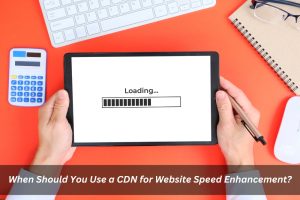When Should You Use A CDN For Website Speed Enhancement?

In today’s rapidly evolving digital environment, the swiftness with which your website loads can either elevate or undermine your online presence. Websites that load slowly tend to exasperate users, resulting in increased bounce rates and the potential to adversely affect your search engine rankings. This is where Content Delivery Networks (CDNs) come into play. But when should you use a CDN for website speed enhancement? Let’s explore the ins and outs of CDNs and help you make an informed decision.
What is a CDN and how does it work?
CDN, short for Content Delivery Network, is a network of strategically placed servers across the globe. These servers work in tandem to deliver web content – such as images, videos, scripts, and stylesheets – to users based on their geographical location. The primary purpose of a CDN is to reduce the physical distance between a user and the server hosting your website, thereby decreasing the time it takes to load your web pages.
The way a CDN works is rather ingenious. When a user requests a web page, the CDN redirects that request to the server nearest to the user’s location. This server, known as an edge server, contains cached copies of your website’s content. By serving content from a nearby server rather than your origin server, CDNs significantly reduce latency, resulting in faster page load times.
How can a CDN help improve website speed?
CDNs offer several ways to enhance website speed:
- Reduced latency: As mentioned earlier, CDNs minimise the physical distance data needs to travel, which reduces latency. This means your web pages load faster, providing a better user experience.
- Load balancing: It distributes the incoming traffic across multiple servers, ensuring that no single server gets overloaded. This load-balancing mechanism further speeds up your website, especially during traffic spikes.
- Caching: CDNs cache static assets like images, CSS files, and JavaScript, storing them on their servers. This means that instead of fetching these assets from your web server every time, CDNs deliver them from their cache, reducing server load and load times.
- DDoS mitigation: It often has built-in security features to protect against Distributed Denial of Service (DDoS) attacks. These security measures can prevent malicious traffic from reaching your origin server and causing slowdowns.
- Global reach: CDNs have a network of servers worldwide, ensuring that your content is accessible quickly to users no matter where they are located. This is especially beneficial for international audiences.
Should you use a CDN for your website speed?
The decision to use a CDN for your website speed depends on various factors. Here are some scenarios where using a CDN is highly recommended:
- High-traffic website: If your website experiences heavy traffic or seasonal spikes in traffic, a CDN can handle the increased load efficiently. It prevents your server from becoming overwhelmed and maintains fast load times.
- Global audience: If your target audience is spread across different regions or countries, a CDN can ensure that users everywhere experience fast loading times. It reduces the latency for international users.
- E-commerce sites: Speed is crucial for e-commerce websites. Slow loading times can result in cart abandonment and lost sales. CDNs can help ensure that product pages and checkout processes are swift and smooth.
- Media-heavy websites: Websites that feature a lot of images, videos, or multimedia content can benefit significantly from CDNs. They cache and deliver these large files quickly, preventing slow load times and buffering.
- Improved SEO: Website speed is important for SEO. Google considers page load times when ranking websites. Using a CDN can positively impact your search engine rankings, making your website more discoverable.
- Security concerns: If you are concerned about security threats like DDoS attacks, a CDN with built-in security features can be a valuable asset in safeguarding your website.
When should you use a CDN for website speed?
It’s not necessary to use a CDN in every scenario. Here are some situations where a CDN might not be immediately needed:
- Small personal blogs: If you run a personal blog with minimal traffic and no global audience, the benefits of a CDN may not outweigh the associated costs.
- Low budget: For websites with budget constraints, investing in a CDN might not be a top priority. However, as your site grows, you can consider adding a CDN to improve speed.
- Static websites: If your website is primarily static and doesn’t have much dynamic content, you might not see as much speed improvement from a CDN. Caching might be sufficient.
- Localised audience: If your website caters to a highly localised audience and doesn’t have a significant international presence, you may not require a CDN.
In these cases, you can start by optimising your website through other means, such as code and image compression, browser caching, and efficient web hosting. Once your website grows or your audience expands, you can revisit the idea of using a CDN for speed enhancement.
How can you use a CDN to improve your website speed?
Using a CDN to enhance your website speed involves a few steps:
- Choose a CDN provider: Select a CDN provider that aligns with your website’s needs, as discussed in the previous section.
- Sign up and configure: Sign up for the chosen CDN service and follow their setup instructions. This usually involves changing your DNS settings to point to the CDN.
- Content caching: Set up caching rules to specify which content should be cached and for how long. CDNs offer various caching options, such as edge caching and full-page caching.
- Content delivery: Ensure that your website’s content is being delivered through the CDN. This may involve making changes to your website’s URLs or using a plugin if you’re using a CMS like WordPress web design.
- Monitor performance: Regularly monitor your website’s performance through the CDN’s dashboard or analytics tools. Check for any issues and optimise accordingly.
- Security: If your CDN offers security features, configure them to protect your website from threats like DDoS attacks.
What are the benefits of using a CDN?
Using a CDN for website speed enhancement offers a range of benefits:
- Faster load times: The most apparent benefit is faster load times, which improve user experience and lower bounce rates.
- Improved SEO: Faster websites tend to rank higher in search engine results, increasing your website’s visibility.
- Global reach: CDNs ensure that your content loads quickly for users around the world, helping you reach a wider audience.
- Scalability: CDNs can handle traffic spikes and increased demand, ensuring your website remains responsive even during high-traffic periods.
- Security: Many CDNs come with built-in security features, protecting your website from common online threats.
- Cost-efficiency: CDNs can reduce the load on your origin server, potentially lowering hosting costs.
What are the drawbacks of using a CDN?
While CDNs offer numerous advantages, they also come with a few drawbacks:
- Cost: Depending on your traffic volume and the CDN provider you choose, the cost of using a CDN can add up. However, the benefits often outweigh the expense.
- Complex setup: Setting up a CDN can be complex, especially if you’re not technically inclined. You may need assistance or support from your CDN provider.
- Potential for misconfiguration: Misconfiguring your CDN settings can lead to issues like broken content or slow loading times. Proper setup and monitoring are essential.
- Limited control: Some CDNs may restrict your control over certain aspects of your website, which could be a concern for advanced users.
Which CDN is right for your website?
Choosing the right CDN depends on your specific needs and budget. Some popular CDN providers to consider include:
- Cloudflare: Known for its security features, Cloudflare offers a free plan with basic CDN services and paid plans for more advanced features.
- Akamai: It is a global CDN provider with a strong focus on performance and security. It serves a wide range of industries, from e-commerce to media.
- Amazon CloudFront: Part of Amazon Web Services (AWS), CloudFront offers a scalable CDN solution with global reach and integration with other AWS services.
- Fastly: It is known for its high-speed content delivery and real-time caching. It’s popular among developers and tech-savvy users.
- KeyCDN: It provides a simple and cost-effective CDN solution with a pay-as-you-go pricing model.
Before making a decision, consider your website’s unique requirements, your budget, and any specific features you need. Many CDN providers offer trial periods, allowing you to test their services before committing.
Conclusion
In today’s digital landscape, website speed is important for retaining visitors, improving SEO, and enhancing the overall user experience. Content Delivery Networks (CDNs) play a crucial role in achieving these goals by reducing latency, distributing traffic, and offering security features.
To determine if a CDN is right for your website, evaluate your specific needs, including traffic volume, audience location, and budget. While CDNs offer numerous benefits, it’s essential to choose the right provider and configure it correctly for optimal results.
By using a CDN strategically, you can ensure that your website loads quickly, providing a seamless and satisfying experience for your visitors, and ultimately contributing to the success of your online presence.
Ready to supercharge your online presence and enhance your website speed? Look no further than Nifty Websites Australia! Our professional web design services are tailored to your specific needs, ensuring that your website not only looks stunning but also loads lightning-fast. We understand the importance of speed for user experience and SEO, and we’ll help you choose the right Content Delivery Network (CDN) to optimise your site’s performance. Don’t let slow loading times hold you back; take action now and contact us to revamp your website with our expert web design services. Speed up your success with Nifty Websites Australia today!
